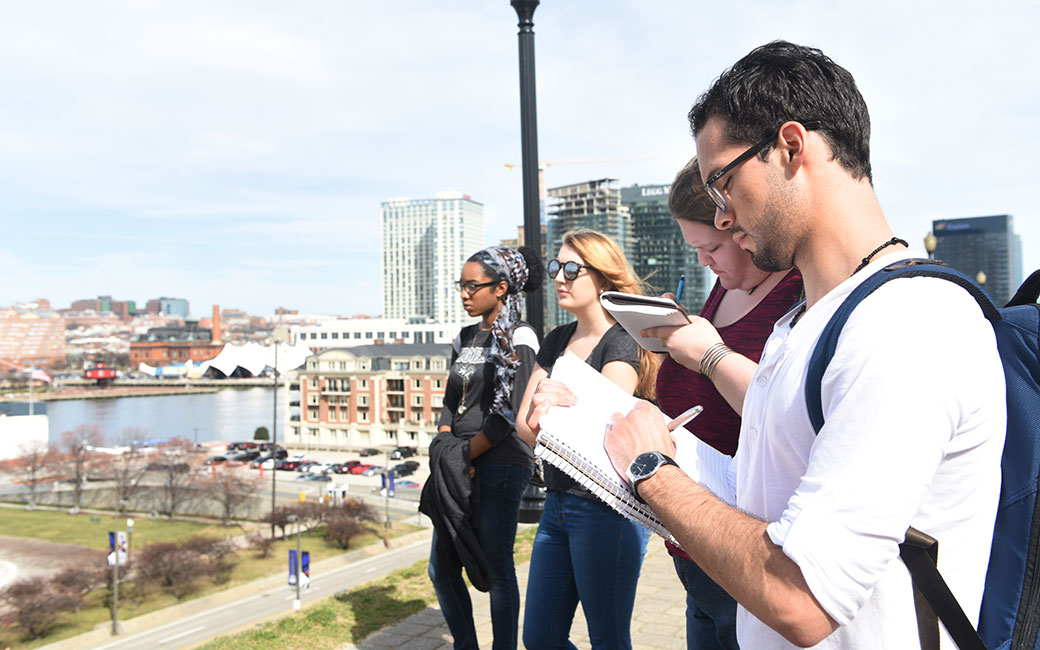Summer program invites students, faculty to conduct research for the public good
TIGURS introduces rising sophomores to campus culture of research
By Rebecca Kirkman on March 16, 2022

This summer a cohort of 16 rising Towson University sophomores will develop their research skills while working with faculty mentors on an interdisciplinary research project that will make a positive impact on the Baltimore area.
The inaugural Towson Inquiry Grants for Undergraduate Research in Summer (TIGURS) program, running from July 5 – August 5, will introduce students to the campus culture of research while connecting faculty members from across the university on interdisciplinary projects.
“At most universities, undergraduates rarely have funded research opportunities, let alone this early in their academic careers, says Melanie Perreault, Towson University Provost. “At TU we are committed to making research accessible and meaningful, and this new program is a perfect example of that commitment.”
“This project is at the intersection of strong identities of our university as a research institution, as an anchor institution for Baltimore-Washington region and as an institution that supports professional growth of undergraduate students,” says Alexei Kolesnikov, professor and director of undergraduate research.
Targeting students after they have completed their first year of study extends the current undergraduate research opportunities offered through Undergraduate Research and Creative Inquiry (URCI) within the Office of the Provost. The TIGURS program strengthens the culture of undergraduate scholarly inquiry as the university works toward achieving a Carnegie Research Classification of R2: Doctoral University — High Research Activity.
“Undergraduates may ask themselves, ‘Why should I do research?’ or ‘How am I going to leave the world a better place through research?’” says Clare Muhoro, associate provost for academic affairs. “This program is a window through which students can start exploring the answer to these questions.”
Accessible to all majors, TIGURS is built around a common theme that can be addressed by a variety of disciplines and methods. This summer, faculty from the sciences, humanities and social sciences will lead students through seminars in qualitative research, collaborative design and human–computer interaction.
Faculty and students will then work with community partners in a series of workshops focused on the collaborative design of digital applications serving community needs. Students will develop skills in qualitative research, multimedia production, human–computer interaction and collaborative design while at the same time building networks with communities in Baltimore.
Supported by the Office of the Provost, students selected for the five-week program will receive housing and meal plans in addition to a $3,000 stipend.
This summer’s project brings together four faculty mentors from the College of Liberal Arts and the Jess & Mildred Fisher College of Science & Mathematics. Samuel Collins in the Department of Sociology, Anthropology & Criminal Justice and Suranjan Chakraborty in the Department of Computer & Information Sciences lead a team including anthropology professor Matthew Durington and English professor Jennifer Ballengee.
The program builds on their existing scholarship and partnerships supported through BTU—Partnerships for Greater Baltimore.
“I am excited about the pedagogical opportunity that presents in developing and running an inter-disciplinary research driven curriculum for rising sophomores,” Chakraborty says. “I am also looking forward to using this program to develop deeper insights into my collaborative work with Professors Collins, Ballengee, and Durington, that harnesses undergraduate students for an anthropology-driven investigation into technology inequality in the society.”
“We hope that students come away from this with an understanding that research can bring together people in order to do good things,” Collins adds. “I’m really looking forward to introducing students to our community-based research. We tend to teach discipline-focused classes, and I don’t think students realize how much of our research involves collaborating with people.”
Interested students should apply using this form by April 4. To get involved or learn more, contact Undergraduate Research & Creative Inquiry.